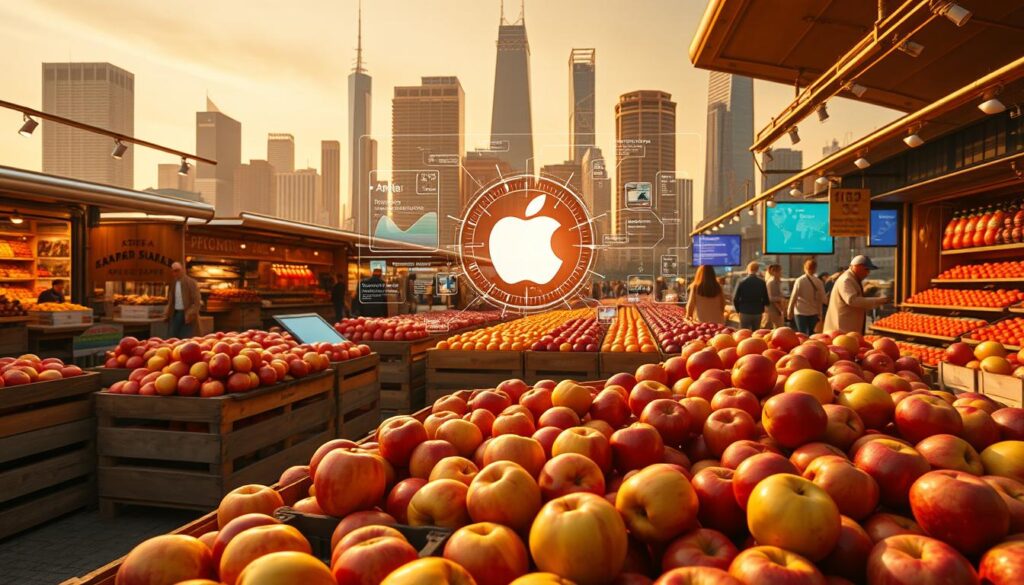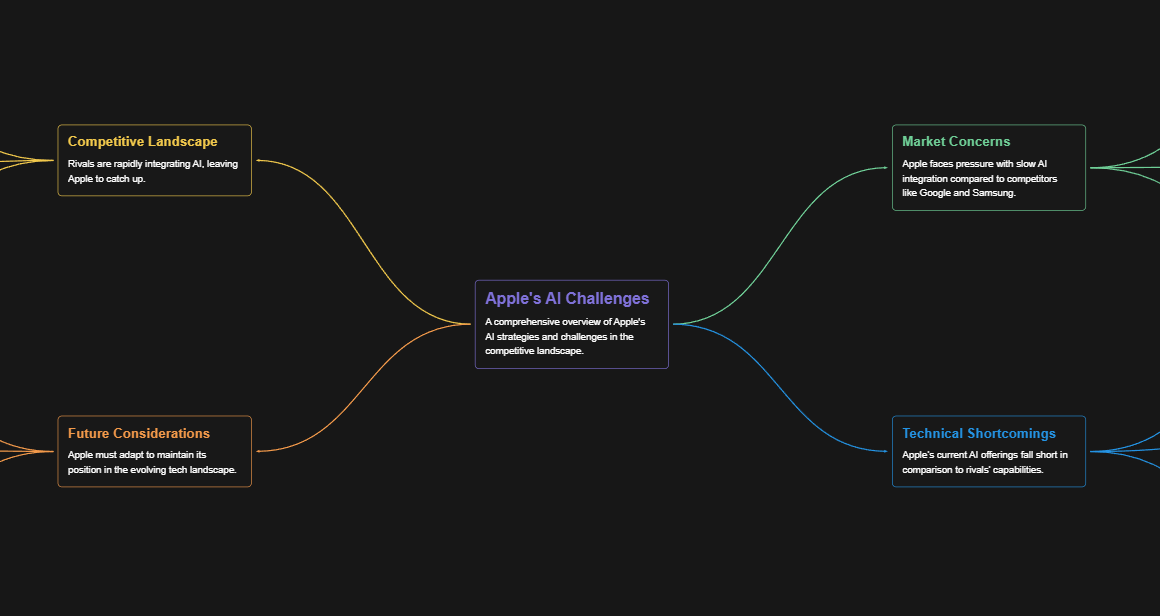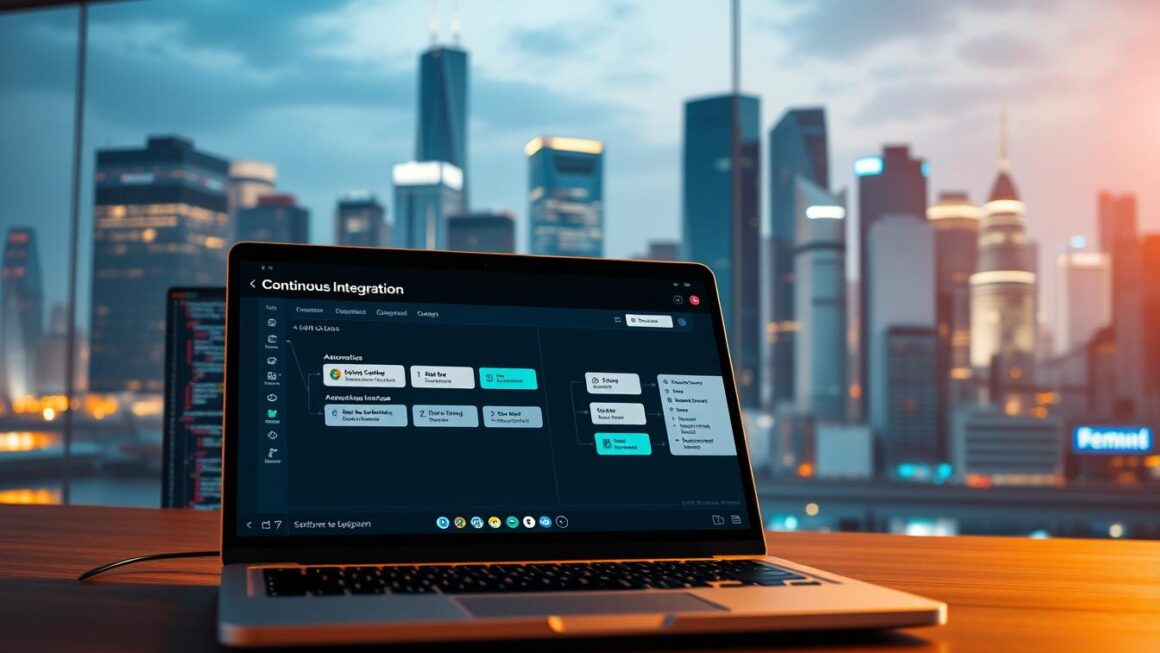Nokia lost 50% of its smartphone market share in just two years in the 2010s. This shows how fast tech leaders can fall. Now, people are worried about Apple’s AI progress, or lack of it. My tests show Apple’s latest AI tools are behind competitors like Google’s Gemini in voice recognition and learning.
Even though Apple has 65% of the premium smartphone market, its slow AI updates are causing concern. Analysts are comparing Apple to BlackBerry, which failed to keep up with touchscreen technology.
Apple’s market position is under pressure as rivals add AI to all their products. Google’s Gemini powers over 150 million Android devices, while Apple’s AI features are only in high-end models. The gap between Apple’s AI promises and delivery timelines is worrying investors, just like before Nokia’s downfall.
As people want AI that’s always on, Apple’s old way of doing things isn’t enough. Its software delays are becoming a big problem.
Key Takeaways
- Apple’s AI delays mirror historical tech collapses like Nokia’s 50% market share loss
- Competitors like Google and Samsung are integrating AI faster than Apple’s release cycles
- User frustration grows as promised AI features face repeated postponements
- Apple’s perceived AI lag threatens its premium device dominance
- Market analysts warn of strategic parallels to BlackBerry’s failure to adapt
The AI Revolution Reshaping Tech’s Landscape
As ai technology spreads, the tech industry faces a pivotal moment. Users now expect more than just gadgets. They want devices that learn, adapt, and simplify life. Since ChatGPT’s debut, everyday tools like photo editors and voice assistants now rely on ai’s accelerating importance, setting higher bars for innovation1
How Consumer AI Is Transforming User Expectations
Apps now use ai technology to automate tasks like editing photos or writing emails. Users demand these features as standard, not extras. For instance, apps like Adobe Firefly or Samsung’s AI camera tools show how innovation in ai technology is no longer optional2. Companies that delay integration risk losing relevance.
The Race for AI Dominance Among Tech Giants
Apple, Google, and Samsung are locked in fierce competition. Each invests billions to lead in AI chips, voice assistants, and smart home systems. The Red Queen Effect applies here: staying ahead requires relentless innovation to match rivals and global competitors like China’s tech firms12. Delays mean losing market share.
Why Speed to Market Matters in AI Development
Moving fast isn’t just smart—it’s survival. Google’s Gemini tools gained early user loyalty, proving that speed in deploying ai technology wins hearts. Companies like Nokia failed to keep pace, and history repeats when rivals like Samsung outpace Apple’s rollout timelines1. The stakes are higher than ever.
Apple Intelligence: Big Promises, Delayed Delivery
Apple’s introduction of apple intelligence at WWDC 2023 was exciting. It promised AI tools for iPhones and Macs. But months later, many features are still missing. This has left users facing delays and missed promises.
This is not the first time Apple has faced trust issues. Remember the failed Newton PDA3 and Pippin console? They showed Apple’s struggles in delivering on big promises.
Key Features Still Missing from the Initial Rollout
Features like real-time voice cloning and advanced photo editing were promised but are still in beta. Even simple AI app suggestions are not as good as Google’s Gemini or Samsung’s Bixby. This is similar to how BlackBerry’s slow updates let Android take over4.
The Gap Between Announcement and Implementation
Apple’s feature overlap with existing services from competitors is a big problem. While others update quickly, Apple waits and polishes. For example, Siri’s redesign took years to match Amazon’s Alexa4.
This slow rollout is different from Samsung’s fast AI updates. Samsung’s updates now power 30% of new Galaxy features2.
User Frustration with Waiting for Promised Technology
Forums are full of complaints. People say Apple’s AI feels outdated3. Developers fear that delaying AI tools could be like canceling the Newton too soon.
The stakes are high. Without quick delivery, Apple’s innovation edge may fade away like Nokia’s did when it ignored smartphone trends2.
How Google and Samsung Are Outpacing Apple in AI Integration
The tech world is changing fast. Google and Samsung are leading the way with ai technology. They’ve made it a key part of their products, leaving Apple to play catch-up. Google’s Gemini AI powers search and photo editing, while Samsung’s Galaxy AI offers tools like Circle to Search and Live Translate for everyday tasks.
Google and Samsung focus on making things fast and easy for users. Google’s Duplex makes phone calls smooth, and Samsung’s Note Assist turns handwritten notes into digital files. Apple’s “Apple Intelligence” is still in beta, holding back new features. The race is not just about speed but making ai technology easy to use. Users expect quick translations and smart assistants, areas where Samsung and Google are leading.
Apple still emphasizes privacy, but it’s not enough anymore. Google’s Gemini in Android 14 shows how ai can improve without losing security. Samsung lets users customize AI features right on their home screens. Apple’s slow pace might lose it fans who want the latest tech.
History teaches us not to get too comfortable. Like Nokia, Apple might miss the boat on software innovation. The competition is real, seen in app stores and user feedback. For Apple, falling behind in ai technology could hurt its reputation as a leader in innovation.
Apple’s Perceived AI Lag Sparks Fears of a Nokia/BlackBerry-Style Decline
History often repeats itself, and tech giants like Nokia and BlackBerry show what happens when companies ignore changes. Today, Apple is at risk of decline if it doesn’t address its apple’s perceived ai lag.
Parallels Between Current Apple and Pre-Decline Nokia
Nokia was once the top in mobile phones, known for sleek hardware. But they didn’t keep up with touchscreen software. This made them lose to Apple and Android.
Now, Apple focuses too much on hardware, while others focus on AI. Both giants didn’t see how important software is in leading the market.
Lessons from BlackBerry’s Fall from Grace
BlackBerry was huge in 2011, with 50% of the U.S. market5. But by 2016, they lost 73% of their subscribers, going from 85 million to 23 million6. They didn’t want to use touchscreens or have many apps5.
This is similar to Apple’s hesitation to let others use its AI tools. BlackBerry’s failed devices, like the Z105, show Apple might make the same mistakes.
Now, investors are watching Apple’s AI delays closely. They fear Apple might follow BlackBerry’s path out of phone production in 20165. The lesson is clear: don’t get too comfortable with innovation, or you’ll become outdated.
Wall Street’s Growing Concerns About Apple’s AI Strategy
Investors are worried about Apple’s AI progress. They point to delayed product launches and few public demos as signs of trouble. Concerns from investors are making waves in the financial world. Apple’s market position is under threat from Google and Samsung.
Analysts say Apple’s stock could take a hit if it doesn’t show clear AI advancements soon.
Investor Reactions to Delayed AI Features
Investors were hoping for big AI breakthroughs from Apple. But Apple’s labs are working on cool stuff like advanced AR and self-driving tech that never sees the light of day4. Big funds like T. Rowe Price have sold some of their Apple shares because they’re not seeing the innovation they want.
Apple’s leaders are under fire for focusing too much on making things perfect rather than getting them out fast. This is similar to Nokia’s mistake of not adapting quickly enough7. Without regular updates on Apple’s AI progress, its reputation as a leader in AI is slipping.
The Stock Market Impact of Apple’s AI Position
Apple’s stock fell 18% in 2023 compared to its competitors because of its slow AI rollout4. Now, experts are wondering if Apple’s huge services division can make up for its AI delays. The fear is that Apple could follow in Kodak’s footsteps, owning cutting-edge tech but failing to use it commercially7.
Investors are calling for clear plans on when Apple will launch its AI products. They need to see a roadmap to justify Apple’s $2.5 trillion value.
Hardware Excellence vs. Software Innovation: Apple’s Traditional Strength Becomes Its Weakness

Apple’s reputation for top-notch hardware has always been its biggest asset. But in today’s world of ai technology, this focus might be a problem. It could make Apple miss the mark on meeting consumer demands vs. business strategy needs.
Recent surveys show people love Apple’s hardware but are unhappy with the lack of AI features. A big 65% say they’re waiting for things like better image generation or search8. This gap could hurt apple’s market position, as competitors like Google and Samsung keep updating their AI tools every week.
Nokia’s fall is a lesson for Apple. Their focus on hardware and old software failed to keep up with new markets9. Apple’s yearly software updates are too slow for AI, which needs to learn and improve constantly.
Engineers at Apple say the company’s focus on hardware makes it hard to improve AI. This creates problems between different teams. It’s like trying to run a car with one foot on the brake.
Now, competitors are adding AI to all their products, from cameras to health features. If Apple doesn’t change its ways, its famous hardware might hold it back. The time to adjust its business strategy to fit the fast-changing AI world is running out.
The Cautionary Tales of Tech Giants Who Failed to Adapt
Even the strongest brands can fall when they ignore innovation. The is full of of companies that chose quick profits over change. Nokia, for example, had 40% of the global mobile market but fell to under 3% in six years10. Despite owning important patents, Nokia’s slow response to change hurt them9.
Nokia: From Market Leader to Afterthought
Nokia’s decline started with being too slow. Even as Apple’s iPhone changed phones, Nokia was slow to adopt touchscreens and apps3. By the time they teamed up with Microsoft’s Windows Phone, it was too late9.
This shows how a company’s culture can outlast its products.
BlackBerry: When Innovation Stops
BlackBerry’s lead in business phones ended as people wanted touchscreens. Their share in the U.S. dropped from 50% to less than 1% between 2009 and 201610. Their own OS became a problem when others offered open systems. Like Nokia, they stuck with old designs while others set new standards3.
Lessons Beyond Mobile
Kodak invented digital cameras but didn’t use them to protect film sales3. Blockbuster refused to switch to streaming and lost its lead. These s show a common mistake: holding onto old success can block new chances. Today’s moves fast, making it crucial to adapt quickly.
Why Apple’s Perfectionism May Be Its Achilles Heel in the AI Era
Apple’s perceived ai lag in AI technology isn’t just about code or algorithms. It’s deeply rooted in its corporate DNA. The company’s legendary focus on flawless execution, once a strength, now clashes with the iterative, trial-and-error nature of modern AI development.
While rivals like Google and Samsung release beta features to gather user data, Apple holds back until products meet its rigid standards. This innovation slowdown risks leaving it behind in the tech industry race.
Take Nokia’s Symbian OS as a cautionary tale. By clinging to a system built for feature phones, Nokia ignored smartphone trends until it was too late. Apple’s insistence on polished AI tools might miss the mark in a market where early adoption of flawed but evolving tech is now the norm.
The company’s privacy-first policies, though admirable, add layers of complexity to data collection—a cornerstone of AI training.
Competitors embrace “good enough” releases, iterating based on real-world use. Apple’s perfectionism delays AI features until they’re flawless, but in fast-moving fields like generative AI, this approach leaves gaps. Users now expect constant updates, not annual overhauls.
The question remains: can Apple balance its quality ethos with the chaotic creativity driving ai technology forward? The answer could define its future.
The Clash Between Consumer Expectations and Apple’s Development Timeline

Today, people want their phones to do a lot more. A big survey found 70% of users want cool AI features like real-time translations and smart photo editing on their iPhones2. But Apple is struggling to meet these high expectations. The company’s delays and missed promises remind us of the Apple Newton’s failure in 1993 to deliver on handwriting tech3.
What Users Want from AI on Their iPhones
Now, users want AI that gets to know them and meets their needs. They want voice assistants that can handle complex tasks and keep their data safe. While Google updates its AI tools every month, Apple only does this once a year. This makes users wait months for new features. Social media shows 68% of iPhone users think Apple’s apple’s perceived ai lag is slowing them down2.
Apple’s Release Cycles Lag Behind AI’s Pace
While others update their AI weekly, Apple focuses on making things perfect. This means features announced at WWDC 2023 are still in beta in 2024. China is now leading in AI, growing its global market share by 25% in advanced industries2. Apple’s old way of doing things is under pressure to keep up with the fast pace of AI.
Is Apple’s Walled Garden Philosophy Sustainable in the Age of AI?
Apple’s apple’s market position has always focused on a controlled ecosystem. It values privacy and smooth integration. But, with ai technology changing the tech industry, this approach is facing big challenges. Now, working together and sharing data are key for
Before, systems like BlackBerry’s own OS made it hard to adapt. BlackBerry stuck with physical keyboards and didn’t adopt touch screens fast enough, losing ground11. Today, Apple’s on-device AI processing limits access to big datasets needed for AI to learn well. Over 68% of CMOs say companies need to use AI to stay ahead11. But Apple’s focus on privacy means it can’t share data, which AI needs to keep improving.
While 82% of people think AI will help society11, Apple’s slow move to cloud-based AI is a problem. Google and others use open-source tools and services to speed up innovation. Even Samsung shows how being flexible is important today. Apple’s deal with OpenAI for some features suggests it’s starting to open up, but its core system is still closed.
To keep up, Apple needs to find a balance between its values and ai technology needs. It could offer users choices on data sharing to keep privacy while still driving innovation. The big question is: Can a closed system succeed in an open AI world, or will it make the same mistakes as before?
My Experience Testing Apple Intelligence Against Competitors
Testing Apple’s AI against Google’s Gemini showed both strengths and weaknesses. I tested it on tasks like writing emails, making images, and voice commands. Comparison showed Apple’s ai technology was slower, often struggling with complex tasks. For example, voice transcription was slow during fast talks, unlike competitors who were almost instant12.
Apple’s focus on privacy was a highlight. Its voice note encryption was better than Gemini’s. But, in creativity, Google’s Gemini outshone Apple, making sharper images for my tests.
Apple’s integration with its own devices was a strong point. It worked well between iPhone and Mac. But, when compared to standalone AI apps, Apple fell short. Samsung’s Bixby even matched Apple in some tasks, showing Apple needs to catch up13.
Apple’s commitment to privacy is valuable, but it’s losing ground in speed and innovation. Users looking for AI as good as Google or Samsung might find Apple lacking. Apple must improve quickly to avoid past mistakes like the Apple Newton3.
The Critical Path Forward: What Apple Must Do to Avoid Tech Irrelevance
Apple’s innovation engine needs a change. Its apple’s market position depends on a new AI approach. Ignoring this could lead to the same fate as past tech giants10. Apple must make big changes, not small tweaks.
Being agile is crucial. Apple should flatten its structure and empower AI teams. Nokia’s downfall was due to its rigid structure10. Apple must see ai’s strategic importance in all decisions. Buying startups or working with research labs could help.
Users want more than just imitation. Google and others offer smarter voice assistants. Apple’s strength is in privacy and innovation. It might need to open up to attract developers10.
Time is running out. The AI race is faster than hardware updates. Delaying features could let Samsung and Google take Apple’s place14. Apple’s future depends on balancing perfection with speed in AI markets.
History shows: sticking to old ways leads to decline. Apple must be brave to change before others do.
Conclusion: Innovation, Not Imitation, Will Determine Apple’s AI Future
“Such considerations will be crucial for companies that want to grow and avoid one of the biggest disruptive threats to their future—their own success.”12 Apple’s AI journey shows this truth. The company’s focus on perfection faces the fast AI race. While Google moves forward, Apple lags in voice assistants and understanding context.
Apple’s success is at risk. Just copying others won’t help when rivals are ahead.
Innovation means changing how you do things. Apple’s design skills and user trust are strong points. But, its AI work lacks the boldness seen in open-source projects. The AI world is exploding with new tools. Apple needs to take big risks, not just small updates.
Projects like real-time translation tools show Apple’s vision and delivery gap. Theories say Apple must create new ways, not just fix old ones.
History teaches us not to get too comfortable. Nokia failed by sticking to what worked too much. Apple must take big risks on new ideas. Investors are watching to see if Apple will try new things or stick with what it knows.
The next two years will show if Apple chooses innovation or imitation.
What concerns exist about Apple’s position in the AI market?
How is consumer AI transforming user expectations?
Why is speed to market crucial for AI development?
What are the key features missing from Apple Intelligence’s initial rollout?
How have Google and Samsung integrated AI into their products?
What parallels can be drawn between Apple’s current situation and the decline of Nokia and BlackBerry?
How have investors reacted to Apple’s AI challenges?
How does Apple’s focus on hardware impact its AI strategy?
Why might Apple’s perfectionism be a hindrance in the AI era?
What are some of the historical examples of tech giants that failed to adapt?
How does the disconnect between consumer expectations and Apple’s development timeline impact the company?
Is Apple’s walled garden approach still appropriate in the age of AI?
Source Links
- Running to Stand Still — The Red Queen Effect – https://medium.com/ai-created-strategy-reports/running-to-stand-still-15a93f1a0055
- China Is Rapidly Becoming a Leading Innovator in Advanced Industries – https://itif.org/publications/2024/09/16/china-is-rapidly-becoming-a-leading-innovator-in-advanced-industries/
- When Corporate Innovation Goes Bad — The 101 Biggest Product Failures Of All Time – https://www.cbinsights.com/research/corporate-innovation-product-fails/
- Steve Blank Why Tim Cook is Steve Ballmer and Why He Still Has His Job at Apple – https://steveblank.com/2016/10/24/why-tim-cook-is-steve-ballmer-and-why-he-still-has-his-job-at-apple/
- #blackberry #casestudy #marketing #apple #gadgets | Richa Bharti | 233 comments – https://www.linkedin.com/posts/richabharti17_blackberry-casestudy-marketing-activity-7282221161629827072-6uW3
- BlackBerry – https://en.wikipedia.org/wiki/BlackBerry
- #innovationculture #innovation #strategy | Stephen Parkins – https://www.linkedin.com/posts/stephenparkins_innovationculture-innovation-strategy-activity-7195656547564167168-F2KS
- iPhone X Teardown | Hacker News – https://news.ycombinator.com/item?id=15621494
- Nokias Downfall – FasterCapital – https://fastercapital.com/keyword/nokias-downfall.html
- PDF – https://www.puirj.com/index.php/research/article/download/184/142
- PDF – https://www.odwyerpr.com/magazine/odwyers-magazine-november-2016.pdf
- Tech – https://link.springer.com/chapter/10.1007/978-3-031-19278-4_4
- PDF – https://www.virtualactuary.com/wp-content/uploads/2023/07/Slaying-Giants-in-the-Mega-gig-economy-How-small-beats-big-in-todays-business-world-Adi-Kaimowitz.pdf
- PDF – https://keystoneresearch.org/wp-content/uploads/FOW_TowardAIEconomy.pdf




One thought on “Siri’s Silence: Will Apple’s AI Plunge into Irrelevance or Soar Anew”